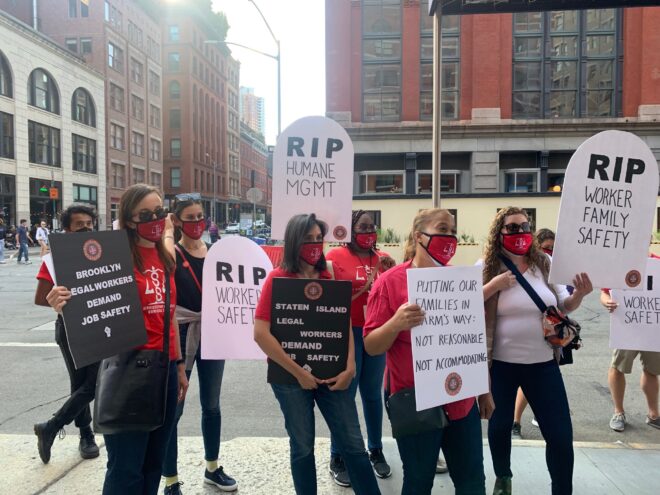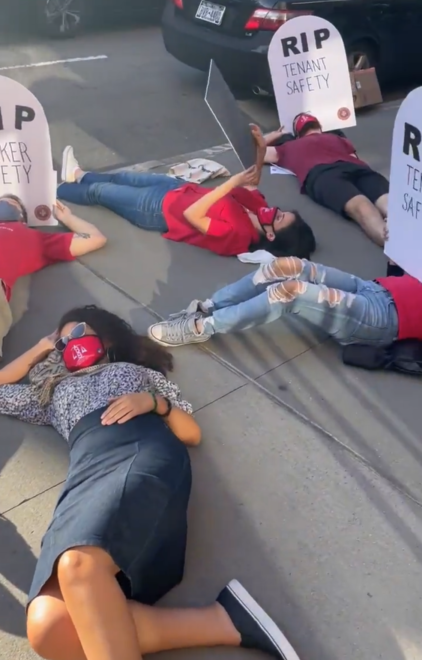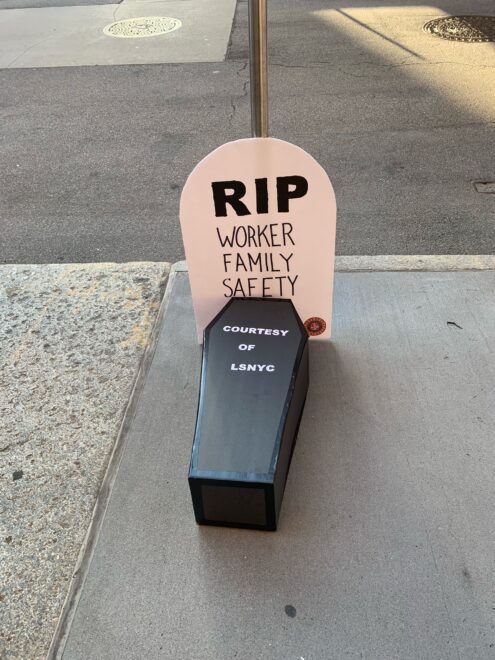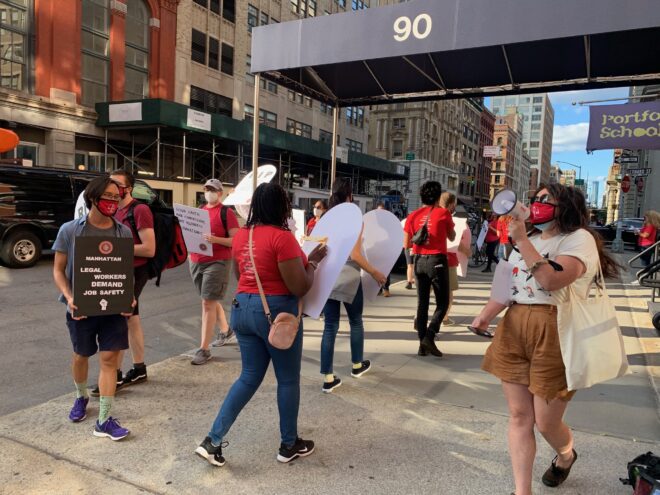September 10, 2021
On Friday September 10th, LSNYC union members staged an action in front of the LSNYC Executive Director’s Tribeca apartment building to protest LSNYC management’s demand that staff return to in-person appearances, with no plan to protect staff with vulnerable family member, and no guarantee that any high-risk staff would be excused from in-person appearances.
Law360 was at the scene and reported on our union members’ powerful action in Legal Services NYC Attys Protest Court Demands Amid COVID. Reporter Emily Lever wrote:
Employees at Legal Services NYC, the largest civil legal service provider in the U.S., picketed their boss’s Manhattan apartment Friday to protest “unnecessary and dangerous in-person court appearances” in the latest battle waged by organized labor over COVID-19 safety.
Legal Services NYC employees walk a picket line in front of the executive director’s apartment to protest the organization’s handling of COVID safety. (Emily Lever | Law360)
Members of the Legal Services Staff Association (UAW 2320) walked a picket line in front of executive director Ron Rasmussen’s building before lying down on the pavement, staging their own deaths, for 54 seconds, a reference to the 54,000 people who have died of COVID-19 in New York State. Their demand was that LSNY management provide attorneys more exemptions and lean on the judiciary to stop it from mandating that litigants physically come to court for routine appearances in civil matters.
“We just want to push back strongly against being sacrificial lambs, along with our clients, to this idea that we’re going back to normal,” union delegate Natalie James, a core organizer for the action, told Law360. “The senselessness of these in-person court appearances is part of this magical thinking, this unrealistic and unnecessary push to get back to normal in the era of delta.”
New York City courthouses are cramped, poorly ventilated, not COVID-safe, and overall hazardous for the health of attorneys, their clients, and people living with them to whom they might bring an infection home, according to the protesters, who held signs shaped like gravestones — and in one case, a cardboard replica of a coffin — to drive their point home.
In the union’s view, the judiciary is being incautious about COVID safety, given the ongoing nature of the pandemic and the success of remote appearances for routine proceedings, and LSNY is failing its employees by not using its leverage to get the court system to pump the brakes.
Housing attorney Lailah Hanit Pepe holds her son’s oxygen tank as she addresses her coworkers about the need for greater care on COVID risk. (Emily Lever | Law360)
“It defies science, it defies safety,” said housing attorney Lailah Hanit Pepe, whose son has pulmonary hypertension, putting him at severe risk should he contract COVID-19. “If I’m ever forced to endanger my son after all the sacrifices we’ve made— It’s insane in the middle of increasing cases due to the delta variant.”
Hanit Pepe hoisted her son’s oxygen tank with the breathing tubes attached.
“If you don’t have one of these in your closet, you don’t understand,” she said.
LSNY management could not immediately be reached for comment.
This was not the first LSNY management had heard of the issue. Members of the COVID bargaining unit had met with management repeatedly and had heard testimony from employees who had negative experiences requesting reasonable accommodation to be exempt from in-person work. Union members also mass emailed Rasmussen and other members of management on Sept. 6, Labor Day, to ratchet up pressure on the problem of reasonable accommodation.
The union described the reasonable accommodation process as “onerous,” overlong and invasive. It also requires employees to prove they have a disability, but does not apply to people with COVID risk factors, much less their households, union members said.
“Reasonable accommodation does nothing for me, it does nothing for my kids, it does nothing for my coworkers who live with elderly relatives,” housing attorney Vance Gathing told Law360.
“I haven’t gone into court since March 2020, and I’ve won all my cases remotely,” said Gathing, who has a medical condition that puts him at greater risk from COVID-19 and two children too young to get vaccinated.
Union members voted 80% to reject the current reasonable accommodation framework; the matter will now go to arbitration. If a new agreement is not reached within two weeks, the policy will stand.
Reached for comment, the New York court judiciary said that criminal proceedings were also being held in person and suggested that as officers of the court, attorneys have a duty to come in.
“Throughout the pandemic, our number-one focus was to keep the judiciary open, operating and available, as the third branch of government, to the fullest extent possible. Currently, grand juries are sitting, trials being held and arraignments back in person in New York City Criminal Court,” judiciary spokesperson Lucian Chalfen told Law360. “There always will be a reason not to do something, how about look for reasons to do something, which is what officers of the court should be focused on.”




